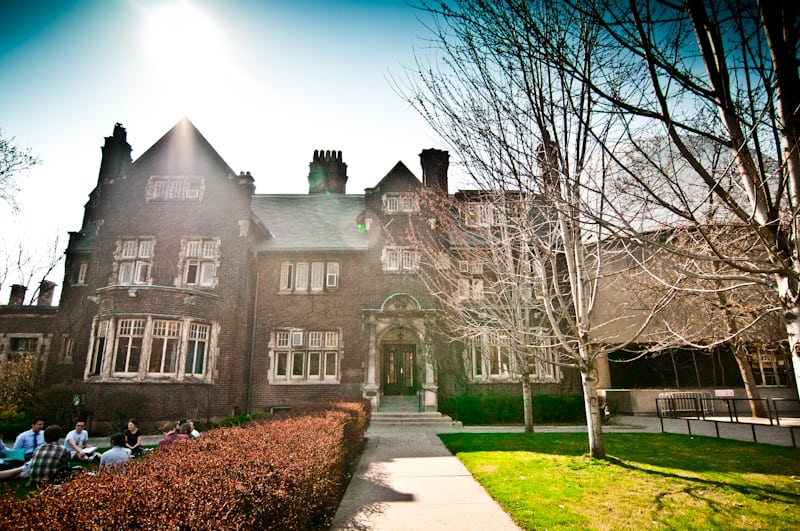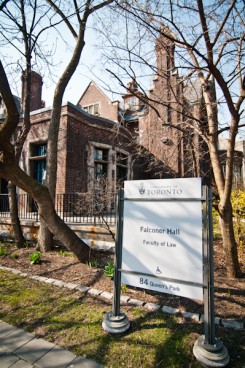During the recent UTSU election, one would have been hard pressed to find any signs that it concerned professional faculties like law, engineering, medicine, pharmacy, or nursing to name a few. In fact, while a total of 13 UTSU board of directors seats were reserved for professional faculty colleges, none were contested in the election, and many were left vacant.
In this article, two law students — one a card-carrying Liberal, the other a card-carrying New Democrat — will talk about what kinds of problems are associated with this state of affairs and what must be done to ensure that the professional faculties will remain in the UTSU in the future.
The issue of representation has persisted for years but has never been addressed. Although having one law representative on UTSU’s board is roughly proportional to the student population, professional faculties still constitute only a small minority on the board and are almost never on the executive team.
In fact, professional faculty students are generally ineligible to run for executive positions. This is because of academic and professional requirements for accreditation that call for full-time student status, which conflicts with UTSU’s requirement that executives not be full-time students.
The lack of representation and voice on the executive is reflected by the agenda of the UTSU every year. UTSU has advocated positions contrary to professional faculty concerns, including many educational and funding proposals. Meanwhile, since 2003, tuition for law students has increased by over $10,000. While UTSU takes up undergrad-specific issues such as flat fees for the Faculty of Arts & Sciences, it does take up the particular challenges facing professional faculty students.
UTSU’s response to professional-faculty concerns has been non-commital at best and downright hostile at worst. Last year, the Engineering Society proposed in a series of documents and meetings that UTSU improve professional faculty representation by adding a VP position for professional faculty issues only and by restructuring the board to include more professional faculty representatives.
The engineering proposal was categorically rejected, with UTSU pointing to the Professional Faculty Committee as a cure-all. Its mandate, to “address issues related to the professional faculties,” is so vague it’s meaningless. In fact, the committee has met only twice this year and accomplished little if anything.
While our clubs actually heal the sick, build homes, and give legal services to the oppressed, the majority of our clubs receive no funding from UTSU. The problem is not that professional faculty students are apathetic or disengaged. By and large, this is a result of structural defects and systemic biases against all professional faculty students at the university.
UTSU clubs funding policy inherently favours larger cross-campus groups with large numbers rather than smaller niche groups with specific interests. For instance, there are requirements for minimum membership, bank accounts, and limits on corporate involvement. The criteria for funding include campus participation rate, level of outreach, and other sources of funding. There are clubs on campus boasting greater numbers than the entire Faculty of Law that make it difficult for small law-related clubs to become recognized and funded.
Furthermore, each professional faculty has its own student government with an independent set of club funding resources and guidelines. Clubs are unable or unwilling to go through UTSU’s lengthy procedures when there are more streamlined processes catered to their needs.
Meanwhile, UTSU events are difficult to attend and unappealing to professional faculty students, most of whom are older, have fully packed schedules, and have faculty-related events that conflict with UTSU events. Orientation events and Blue and White Spirit Week simply cater towards undergraduate students.
As a result, most of UTSU’s fees taken from professional faculty students, which would go to clubs and events they actually participate in, go instead to subsidizing primarily undergraduate clubs and events. In order to stop this, UTSU should earmark a proportional amount of funds to professional faculties and events and eliminate duplication in funding application procedures.
So why are professional faculty students leaving their seats at the UTSU decision-making table vacant? The truth is, many professional faculties don’t even know they are due-paying members of UTSU. Why would they, when they have college specific student governments that have been doing everything that the UTSU does for undergraduates?
Nonetheless, awareness of these issues is increasing both at the U of T and in Ontario more broadly. This year, the Faculty of Law’s student government struck up a working group to look at its relation to the UTSU much like the engineers did last year. Similar studies at Queen’s, Western, and Ottawa are critically analyzing the relationships between professional faculties and primarily undergraduate Canadian Federation of Students. These efforts are a natural consequence of the diverging realities of professional faculty and undergraduate students. Just 10 years ago, tuition for law, business, and medicine students was similar to that of undergraduates. This year, tuition and fees at the U of T Faculty of Law were just over $25,000 a year. Meanwhile, professional faculties have departed from the classic liberal academic model to embrace pedagogy more akin to that found in vocational schools. While these changes have occurred, the CFS and its affiliates have missed the boat by focusing on undergraduate interests to the exclusion of what are now professional faculties with their own interests and concerns.
We believe in student government and what it can deliver to students. However, what we have now is unacceptable: taxation without representation. Reality has changed, so the UTSU and the CFS must either adapt their politics to the modern realities of the education economy or be prepared to face a disintegrating student movement and a future without professional faculties.
These are the personal views of the authors and are not to be imputed to the Students’ Legal Society, the Engineering Society, or the UTSU.



